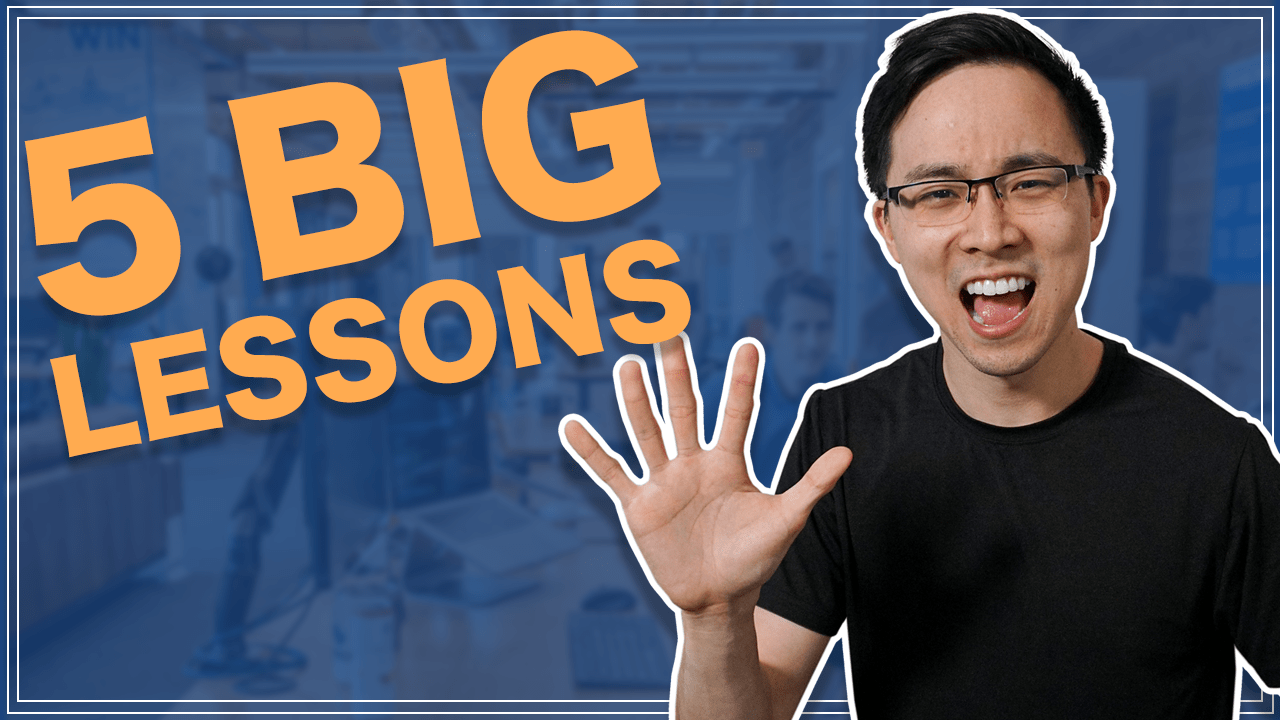Thinking about starting a new business? Then stick with me until the end of this article, because I’m going to share five lessons that I’ve learned starting businesses over the years. Hopefully, by the end of this article, you’ll have a few key takeaways that you can remember as you embark on your own entrepreneurial journey and avoid making some of the mistakes I made.
Lesson 1: Everybody wants to sell you something once you start a business.
The first lesson I learned was that everybody wants to sell you something once you start a business. It’s a common trap that starts as early as when you go to Google and search, how to start a new business. You get a ton of new services that are ready to pitch you about something that they can provide you in getting started.
The reality though, is that it’s actually not that hard to start a small business. Now, this is the part in the article where I have to tell you to do your own research and don’t take anything that I say as legal advice. This is just me sharing my own personal experiences.
Most of the time though, when you’re starting a new business, you’re going to have to go to the secretary of state’s site in your respective state and follow the process that’s outlined there. People will offer you services to help you with incorporation, and that can simply save some time for you if you don’t want to figure it out yourself, but it is a process that is pretty straightforward if you follow the secretary of state’s site in your respective state.
It’s also super common for these sites to pitch you on needing, to have a wow binder of your minutes and all these other things in order for you to get upsold of their particular services.
Getting an EIN from the IRS is also something that you can do on your own. The other thing to keep in mind is that once you incorporate your business, you’re going to start to get a ton of spam credit card offers because they’re going to be scraping the secretary of state’s website for this contact information.
The biggest piece of advice I can give you is to do your own research. And if you’re going to engage a professional, talk to more than one. If it’s the first time you’re engaging with a certain type of professional, you might want to tap into your network and ask if anybody that you know, knows a really good X, Y, Z accountant, lawyer, et cetera.
When you engage professionals, it’s really important that you understand what work is being done. This way in the case where you have to do it yourself in the future, you’re going to have some background and understanding, and you’re not going to be just fully dependent on this professional.
Lesson 2: If you don’t create order, you’re simply going to live in chaos.
The second big lesson that I’ve learned is that if you don’t create order, you’re simply going to live in chaos. If you’ve seen my prior articles on how to build out master SOP is for your virtual assistants, then you know what I’m talking about here.
The problem with a lot of first time entrepreneurs is that they don’t know how to scale beyond themselves. A good book that I can recommend here is The E-Myth Revisited. It’s a pretty basic book and you can probably read it in an afternoon, but any much goes over these fundamentals when it comes to whether or not you are working on your business, as opposed to working in your business.
As I reflect on the businesses that I’ve built as a teenager and a young adult, this was one of the biggest lessons that I couldn’t fully grasp and appreciate at that time. I didn’t get that if I didn’t create systems and processes, I wouldn’t be able to grow my business beyond me.
This meant that at that time, I would have to answer every email, every call and create every single asset that I was making. I wish I had somebody to tell me about this lesson earlier, because I imagine that it would have saved me a ton of headache as well as time, and actually allowed those projects to potentially scale to their true potential.
Lesson 3: Always have a bucket in hand and be ready to bail water.
The third lesson I’ve learned starting businesses is to always have a bucket in hand and be ready to bail. What I mean by that is, imagine that you’re on a ship and pretty much one side of the ship has some water coming in. And so, you have to bail water out of that side, but the second you build that side out, there’s another hole on the other side of the ship that you have to the run to, to bail water out from that side.
That’s pretty much the reality of what it’s like to start a small business. Having a can-do attitude when it comes to running to both ends of the ship, to bail out water can make a big difference when it comes to not getting too demoralized with the things that are happening with your business.
Something I’ve always found helpful is keeping a priority list at all times. Having a simple system of red, orange, green allowed me to prioritize things throughout the day. Red was red alert and so as a result, I would always be trying to solve those issues. Whereas green issues were things that I could potentially push a little bit further down the road.
Ultimately, entrepreneurs seek to solve problems for their customers. The only time when you’re not going to have a bail in your hand is when you either have a flawless product or when you get complacent. The problem with both of these is that when you have a flawless product, it probably mean you could have entered another market. And when you get complacent, it means that your competitors are going to start creeping up on you.
This lesson to me represents the Japanese concept of Kaizen “continuous improvement”. It’s making sure that you are always building and improving on everything that’s going on in your business so that you can sustain yourself for not only today, but also tomorrow and in the years ahead.
Lesson 4: Mistakes are only as good as the lessons that you learned from them
The fourth lesson I’ve learned starting a new business is that mistakes are only as good as the lessons that you learned from them. They often say that done is better than perfect. And it’s true. Launching is always better than just sitting on your hands, trying to create something perfect. The reality is that you’re never going to get customer feedback until you actually launch. And inevitably, you’re going to make mistakes.
Something that I’ve found is that it’s honestly fine to make these mistakes. It’s you trying something new for the first time and learning about what makes a really great customer experience. However, if you keep making these mistakes, then your business is never going to grow.
Back when I ran a college admissions business, a mistake that I made early on was by selling packages of credits. Pretty much the concept was that students could always use these credits and flexibly for help in their college admissions essays. The big problem came when every single student essentially hoarded their credits until a week or two before the application deadline. So as a result, the two of us were essentially heads down, just editing essays, nonstop, and working with our clients in order to make sure that we met their respective deadlines.
This was something though where we wouldn’t have understood that everybody was going to do this customer behavior. We first came out with that concept of credits. We were super naive and thought that students are going to be proactive in their application process and use these credits steadily throughout the fall.
Boy, we were wrong. Needless to say, we learn from this mistake and we adapted our models that we no longer offered credits with the next batch of applicants after the early application deadline. It’s okay if you make mistakes, as long as you’re learning from them. But if you’re not learning, then you’re not growing.
Lesson 5: What your customers experience is ultimately what’s most important
The fifth lesson I’ve learned, is that what your customers experience is ultimately what’s most important. Whenever I’ve started a business, I’ve always had a plethora of advice provided to me as to what I should be doing. There’s always two big reactions when it comes to starting a business, either people are super excited for you or they have some sort of unsolicited feedback that they want to give you about your particular idea. Sometimes the advice is good, but oftentimes it’s bad.
Either way, ultimately, what I’ve learned is that it really doesn’t matter what anybody tells you when it comes to this sort of advice. And the reason why is because these people are often just part of your bubble and they’re not actually part of your ideal customer profile or your ICP.
Until you understand the actual customer that you’re aiming to build your business around, it doesn’t really matter what all the people around you are saying about your business idea. Taking this a step further, sometimes when your customer tells you they want and what they actually want are fundamentally different.
Notice how I said this lesson was all about what your customers actually experienced that matters. Make sure you listen and watch what your customers tend to like. It’s those companies that always obsess about their customers that ultimately build sustained value that leads to more sales and more customers in the future.
Big takeaways
There are two big takeaways that I want you to remember when it comes to the five lessons that I’ve learned in starting a new business.
- The first one is that when you start a new business, everybody’s going to try to sell you something. So do your own research.
- The second thing to remember is that standard operating procedures keep you sane. If you don’t map it out for somebody else in an SOP, then you should have no expectation that they’ll be able to do that particular task for you the way that you would actually like.
And if you have nobody else helping you out on your business, and you’re simply a jack of all trades, that’s stuck working in your business as opposed to on your business.
If you’re just getting started with your business and still trying to nail down what you’re selling, how you’re selling it more, feel free to get my new business jumpstart kit in which I provide you with 15 questions that you can ask yourself to help you get started with your business.
If you found this article helpful, be sure to check out my YouTube channel to get new videos every single week I’ll help take you from zero to self-starter as you grow your business, get more customers, and hone your business acumen. Also, feel free to share it with anybody else that you know is thinking about starting a business and wants to avoid making some costly mistakes.
In the next article, I’m going to share how I started a business as a teenager and some of the lessons I learned there.

